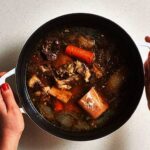What foods are naturally gluten free? Many foods are naturally gluten-free, making them suitable for individuals with gluten sensitivity or celiac disease. Here’s a list of some naturally gluten-free foods:
Fruits and Vegetables:
Most fresh fruits and vegetables are naturally gluten-free. Be cautious with canned or frozen varieties, as they may have added ingredients.
Meat and Poultry:
Fresh meat and poultry are gluten-free. However, be cautious with processed or pre-seasoned meats, as they may contain gluten-containing ingredients.
Fish and Seafood:
Fresh fish and seafood are generally gluten-free. Again, watch for added ingredients in processed or pre-packaged seafood.
Eggs:
Eggs in their natural form are gluten-free. Be mindful of processed or pre-made egg products that may contain gluten.
Dairy Products:
Most dairy products are gluten-free, including milk, cheese, yogurt, and butter. However, some flavored or processed dairy products may contain gluten, so it’s essential to check labels.
Nuts and Seeds:
Nuts and seeds, in their natural state, are gluten-free. However, be cautious with flavored or seasoned varieties, as these may contain gluten.
Legumes:
Beans, lentils, and peas are gluten-free and excellent sources of protein.
Grains:
While wheat, barley, and rye contain gluten, there are several naturally gluten-free grains, including:
- Rice
- Quinoa
- Corn
- Millet
- Buckwheat
- Amaranth
- Teff
- Sorghum
Potatoes and Sweet Potatoes:
Potatoes and sweet potatoes are gluten-free and can be prepared in various ways.
Gluten-Free Alternatives:
There are gluten-free versions of many products available, such as gluten-free flour, pasta, and bread. These are often made from alternative flours like rice flour, almond flour, or coconut flour.
When following a gluten-free diet, it’s essential to read labels carefully, as gluten can hide in unexpected places, such as sauces, dressings, and processed foods. Additionally, cross-contamination during food preparation should be avoided, especially in shared kitchens or when dining out. Always consult with a healthcare professional or a registered dietitian for personalized advice and guidance on managing a gluten-free diet.


